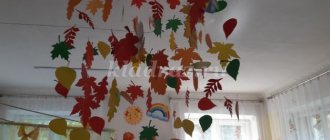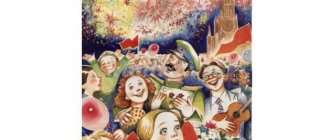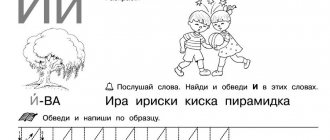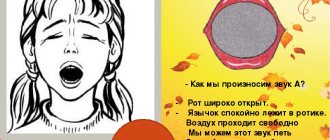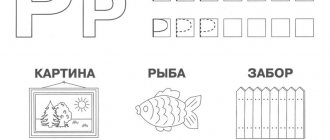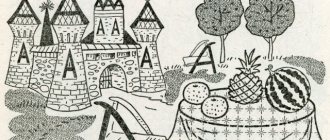Poems about the letter I for children
Berries We picked berries And we kept count: Berries - in a mug. Two berries in your mouth. (E. Avdienko)
There are plenty of berries in the forest! I’ll take them to my mother... (B. Timofeev)
There are no berries more sour than cranberries. I know the letters by heart. (S. Marshak)
I once saw it myself: A yak flew through the skies, a hawk swam in the ocean, a jaguar ran from a doe, an ash tree walked across a field, an ide was fishing for mushrooms in the forest... I’m not lying, believe me, I saw this in a dream. (V. Lunin)
The apple is ripe, red, sweet, the apple is crisp, with smooth skin. I will break the apple in half, I will split the apple with my friend. (Ya. Akim)
The hawk opened the manger on the ash tree and invited the bird children to come to him. But the birds do not approach the ash tree, They do not trust their chicks to the hawk - Look, how cunning! (A. Pudval)
In appearance, the yak is very formidable, But he is a great good-natured man: They say that even children ride it boldly in Tibet! (B. Zakhoder)
Yasha dreams of anchors, dreams of yachts and seas. Yasha is still small, not yet mature enough to become a sailor. When he grows up, he will definitely serve in the navy. (F. Bobylev)
Lizard I caught a lizard, Fear stopped me. - What is there to be afraid of? - The tail may come off! (G. Vieru)
Tale about the letter I
Yashka byaka The day was clear and clear, and the kitten Yasha was gloomy and angry. While walking around the yard, he gaped and fell into a hole. And now he stands there and sticks his tongue out at the pit out of frustration. But the hole doesn’t care!
- Well, okay, wait with me! - Yasha got completely angry and started teasing everyone. The frog stuck out his tongue - the frog was offended. - Yeah! It is for you!
The lizard sits, doesn’t touch anyone, so he tongues it too. The lizard's eyes clap-clap - and into tears. And Yasha is already teasing the lamb with her tongue. The lamb looked, looked and said:
- Fuck you, Yasha. - Am I a jerk?! Well then hold on!
He climbed onto a pile of boxes and shouted to the whole garden:
“Now I’ll stick out my tongue and tease you all day long.”
And then a ripe apple fell from the apple tree and hit Yasha’s forehead - bam!
- Meow!!! - the frightened Yasha screamed, thinking that a hawk had attacked him from above.
He fell head over heels from the boxes, tail and home!
- I’ll tell mom everything!
And everyone laughs:
- Byaka-boyaka and sneak!
(G. Yudin)
Game exercises with the letter I
Publications on the topic:
Didactic game exercises for children of senior preschool age to compose geometric figures Didactic game exercises for children of senior preschool age to compose geometric figures. Target. Exercise children in composition.
Game exercises for the development of graphic skills on the interactive board “Winnie the Pooh in the art workshop” Theme of complex thematic planning “Folk customs” Objectives: • Consolidation of ideas about Nizhny Novgorod folk crafts, folk.
Game exercises to develop facial expressions and emotions for middle-aged children. Sketches for the expressiveness of movements, basic emotions, pantomime studies. Pantomime sketches 1. “Mischievous puppy” - the performer jumps up.
Game tasks and exercises with the sound [P] and the letter p Purpose: to consolidate children’s ideas about the consonant letter and the sound P; to teach to listen, retell a fairy tale and draw an illustration for a fairy tale; to develop.
Games and play exercises for the formation of phonemic hearing 1. Stage Goal: Development of non-speech hearing. Objectives: -Develop the ability to recognize and distinguish non-speech sounds; -Develop auditory attention.
Games and play exercises for the formation of visual perception of a graphic image of a letter in children with mental retardation Visual perception is a set of processes for constructing a visual image of the world based on sensory information obtained with the help of.
Games and play exercises for the development of fine motor skills Good day, dear colleagues and guests who have visited me on my page! Today I want to tell you about games and game exercises.
Consultation for parents “Development of mathematical abilities through didactic games and entertaining game exercises” It is unlikely that a person who has lived in the world for four whole years is not yet familiar with numbers. He probably already knows what “one” and “many” are.
Consultation “Games and game exercises for the development of speech breathing” at the RMO for speech therapists. To correctly pronounce sounds, it is not enough to train only the pronunciation organs. It is also necessary to train correct speech.
Socio-game tasks and exercises to form children's emotional perception of music. Socio-game tasks and exercises to form children's emotional perception of music. 1. “Magic wand” “Magic wand”.
Riddles for children starting with the letter I
Round, ruddy, I grow on a branch: adults and little children love me. (Apple)
It might break, it might get welded. If you want, you can turn into a bird. (Egg)
If it weren't for him, I wouldn't say anything. (Language)
It's always in your mouth, but you can't swallow it. (Language)
The house is round, the house is white. The house was whole at first, but finally it cracked. So the tenant jumped out! (Egg and chick)
The green belt was lost in the grass. (Lizard)
Runs among the stones. You can't keep up with her. He grabbed the tail, but - ah! - She ran away with the tail in her hands. (Lizard)
It stings your ears, stings your nose, The frost creeps into your felt boots. If you splash water, it will fall. Not water, but ice. Even a bird can’t fly, The frost freezes the bird. The sun turned towards summer. What month is this, tell me? (January)
When did the removal of letters from the alphabet begin?
During the period of Soviet power, it was decided to move the letter “Ya” to the last place, since “Izhitsa” was practically no longer used by that time.
Only in church texts could one see it. It is interesting that the Bolsheviks did not react to the removal of Izhitsa from the alphabet; then it seemed to everyone that the authorities had decided to simply abandon one of the sacraments - confirmation.
After all, Izhitsa was used in the word “mirro”. And having abandoned the letter that is part of this word, it seemed to many that the very giving of the gifts of the Holy Spirit was abolished as a means of strengthening his spiritual life.
The removal of “Izhitsa” was not documented, but the elimination of “fita” became the final appointment of the letter Ya as the final letter of the Russian alphabet.
Lesson summary “Teaching literacy. Introducing the letter "s". 1st grade. UKM "School of the 21st century".
Literacy lesson 1st grade. UKM "School of the 21st century"
Topic: introduction to the letter “Y”.
Purpose: to introduce the letter Y, the sound y
Objectives: *educational: introduce the sound s and a graphic example of the letter, develop sound analysis skills; * developing: develop speech breathing and voice strength, phonemic hearing, spatial perception, develop smooth reading skills, expand students' vocabulary, develop concentration and voluntary switching; *educational: to cultivate respect for the opinions of comrades, respect for each other, the ability to listen and hear another person.
During the classes.
1.Organizational moment.
2. Updating knowledge. — Guys, listen to the poem and try to determine the topic of today’s lesson.
Our story without the letter Y is like a lawn without grass. Or, say, a treat without quince and without halva. But great minds, including, of course, us, have never heard of a word starting with the letter Y.
They, and we, and you, remembered unsuccessfully And wept inconsolably s-s-s-s-s! - Guys, who guessed what the topic of today's lesson is? (introduction to the letter “Y”) Slide 1. - Well done! Let's formulate the goals of the lesson. (Learn to hear Y in words, learn to make a sound diagram of words, learn to pronounce the sound Y correctly.)
- You will find out who came to our lesson and brought the duty letter on his tail by guessing the riddle. She lives in water. There is no beak, but she pecks. (fish)—picture. 3.Work to consolidate what has been learned. — To create a sound pattern for the word “fish,” let’s remember the algorithm for working on the sound pattern. ALGORITHM 1. I pronounce the word. 2.I determine the number of sounds. 3.I analyze the sounds in order. 4.I determine the location of the new sound. 5. I designate a new sound.
4.Independent work. Working on a diagram of the word “fish” according to an algorithm - they work independently in the field, one student works at the board. We check the board. - Now let’s determine the position of the letter Y on the “ribbon of letters.”
5.Formation of new knowledge.
Slide 2. - Look at the screen and answer, what does the letter Y look like? (guys answers)
Slide 3. Reading a poem in chorus, the student at the screen follows with a pointer. Here's an axe. The log is nearby. It turned out exactly what we needed. The result is the letter s - We all should know it.
- So what does the letter Y look like? — What else is the letter Y compared to? We’ll find out from the poem on the board. ON THE DESK. They read in chorus, the student at the blackboard follows with a pointer.
S...What a fatty you are! Your tummy is like a pillow. To make it easier for her to walk, she had to get a stick. (Children answer the question)
- Now let's play. Game ". Hear the sound." If a word has a new sound, the guys clap their hands. If there is no sound, they are silent. Fish, jump rope, cube, letters, desk, roof, dad, postcard, birds. ON THE DESK. Read a poem in chorus. -What other words could be added to our game, we learn from the poem?
This bkuva happens at the end and in the middle. At the end there is cabbage, rutabaga, and in the middle there is melon. The guys answer the question posed before reading. —And now we will hold a competition in groups “Who can come up with the most words with “Y”. - What part of the word cannot contain the letter Y, do you think? (guys' assumptions) - Now we will find out which of the guys is right. Let's read the poem.
ON THE DESK. They read a poem in chorus, the student at the blackboard follows with a pointer.
We asked the painters: - Tell me, painters, Where can I find a dozen words that contain the sound “y”? The painters answered us: “There is no such case that the sound “y” would ever appear at the beginning of a word!”
(The guys answer the question posed before reading.)
6.Independent work. Work in pairs. Work according to the textbook on p. 55. "Solve the crossword." The teacher keeps in touch with the children using the form of an open palm “It’s clear - it’s not clear.” Summing up the results of the work. SELF-ASSESSMENT - Raise your hand, those guys who guessed all the words. Well done! Etc. - Name all the words that you came up with. (Cheese, goats, pumpkin, beads.)
7. Reflection. ON THE DESK. They read in chorus. In the Russian language, alas, there are no words starting with “y”. - So, what conclusion can be drawn from these lines? Does the Russian language have a capital letter “y”? - Why?
8. Summing up the lesson.
- Let’s summarize the lesson using the words: I understood... I learned...
I learned... I remembered...
9.Self-assessment for the lesson.
kopilkaurokov.ru
Pronunciation and spelling of "I"
If we listen to the sound of the letter and pronounce it for a long time, we will hear the following sounds [y-a-a-a-a-a-a].
If a letter stretches when sounded, it is a vowel.
The letter I consists of two sounds, a short consonant sound [th] and a vowel sound [a], and it can be sung. This sound feature is called iotation.
I = [й′] [a] - this is how the sounds included in the letter I are designated in transcription.
We see that there is one letter, and there are two sounds in it, one of which Yot is a consonant. In writing it is designated as Y, which is why it is called iotized.
At the beginning of a word or after vowels and separators, we hear the consonant J, and then the vowel sound A.
After consonants, I often softens them: blunder. Here L is pronounced softly thanks to Ya.
But this is only if “I” is in the position of a stressed syllable.
In the unstressed position, “I” seems to repeat the sounds E and I: fields - field.
If I is heard after hissing (ch, sch, sh, zh), guttural (x, g, k), after c, this does not mean that it is written after them. Not at all. We write “a” in these cases.
This rule does not apply only to foreign words, such as: Siauliai, Djakovitsa, Mkrtchyan, etc. Here we write “I” even after sibilants.
The letter “I” in a word is a separate syllable, in a sentence it is an independent word. In some cases, the letter I appears as a whole sentence, for example:
— Who will go to the museum next week?
- I!

